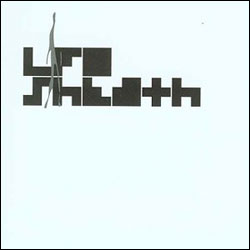ANYONE WHO’S DANCED to techno in the past decade and hears the phrase “We are back” doubtless thinks of LFO. After the surprise U.K. chart success of their wobbly, self-titled electro-techno debut in 1990the name refers to an analog synthesizer’s low frequency oscillatorthe British duo’s follow-up single that year announced, in a gravelly robot voice, “There are many imitators, but we are the true creators. We are back.” The phrase stuck.
But Mark Bell and Gez Varley, the blokes behind the bleeps, didn’t stick around for long, a pattern they’ve repeated consistently for a decade. Every few years, they announce, “We are back”; then they disappear again. 1991’s Frequencies slotted their two initial anthems alongside a dozen more tracks of low-end-intensive techno and firmly rooted Sheffield’s Warp label in the fertile fields of British rave culture, but it was five years and many other projects (Varley also records under his own name and as G-Man; Bell produced Björk’s Homogenic and Depeche Mode’s Exciter and maintains a busy remixing schedule) before the follow-up, Advance. Now, once again, LFO is backthis time as Bell’s solo project.
If he keeps up with his prime number pattern five years between the first two albums, and seven until this oneBell ought to release his next LFO record in 2014. Fortunately, there’s at least enough in Sheath to tide us over until then. The album opens with “Blown,” a sweeping track built from buoyant, padded synthesizer strains, faraway percussive rumblings, and the kind of melting tones that could give Boards of Canada acid flashbacks. It’s classic Warp, and could have been produced any time since 1995 or so, as could the pinging “Moistly.” But LFO’s talent is in taking well-worn forms and making them subtly new, and so on “Mum-Man,” Bell steams into a storm of distorted drums that seems to reinvent techno from the inside out, pushing its robotic impulses to overdriven extremes. Like most dance music, it leavens the steady beat with syncopation, but as if in reference to an ever-shifting pointas though the rhythm were not 4/4 but 17/4 or 59/4 or some meter edging asymptotically toward a perfected irregularity. “Mum-Man” pulses hard on the one but breaks into innumerable splinters inside, a strategy used to even stronger effect on “Freak.”
Outfitted with the vocoded refrain, “This is going to make you freak,” the track is Sheath‘s club highlight, as well as an obvious attempt to reclaim the glories of “We are back.” Still, as both description and injunction, it’s true. Played at home, it shakes you by the tweeter, while in the club it’s capable of laying waste to the whole floor. No music this chaotic ever came straight from a 4/4 beat. Thank God for prime numbers.





